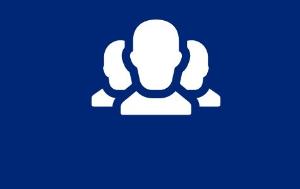Using personal branding for your own career:
build your own personal brand!
Personal branding via social media is increasingly becoming a valuable lever for one's own career - because social media in particular opens up a wide range of opportunities. It is not only products and companies that gain more attention and reputation through a strong brand and consistent branding. As an executive or specialist, you too can benefit immensely from making yourself and your expertise visible.
But why should individuals become a brand, appear as such and engage in self-marketing? Is it not a contradiction if specialists appear and act like companies?
Even if the principles and measures for your own personal branding are similar to those of a corporate brand, building a personal brand can currently play a decisive role in how your career develops.
Amazon founder Jeff Bezos once said, “a brand is what other people say about you when you’re not in the room.” It is therefore crucial to consciously build your own personal branding and thus sharpen your own profile. When marketing yourself, focus on making your own expertise visible to all of the relevant target groups you want to address.
Even if you cannot directly influence how others perceive you, you can steer your presence and the attention it attracts to you and your message. And this not only benefits your current position in your company, but also boosts your reputation and market value.
Definition of personal branding: what exactly is a personal brand?
Personal branding refers to the (nowadays predominantly) digital marketing of people with the aim of presenting them as their own brand in the world of business. Personal branding is often equated with the terms personal brand, personal marketing and self-marketing.
In contrast to classic marketing, an individual person is made visible as a brand or even a product. Personal branding uses the corresponding skills and character of a person to create a striking profile – always with the aim of presenting them effectively and making them stand out from the crowd.
The benefits of personal branding: what you should expect
In addition to an increasingly positive impact on their own company, employees and executives also benefit from personal branding when it comes to career development. Employers and HR managers are increasingly looking for specialists and executives directly by conducting their own searches and engaging in active sourcing.
Strategically designed personal branding is very useful if your main focus is (internal) career development, new job offers and boosting your reputation – provided that you find a clear positioning for yourself, deal with topics you are passionate about and are smart about networking in the corresponding industry. Of course, successful personal branding can also reap financial rewards, whether it's with the current company or a change of job.
Another advantage is that, in many cases, the level of recognition you have gained through your personal brand will enable you to exert a greater influence on the marketing and sales of the corporate brand than the company itself. There is an obvious reason for this: it is becoming increasingly clear that social media users are more likely to trust a person (i.e a personal brand) and find them more credible than a company. So build your personal branding strategically, plan your next steps and be consistent in how you present yourself externally.



Building your personal branding: the four questions you should ask yourself
In order to find an appropriate and distinctive positioning for your personal branding, you should start by asking yourself some essential questions about yourself and your expertise.
Are you an
Are you an
To move up, earn more or be invited to speak at a renowned conference? When it comes to personal branding, it is also crucial to start strategically and think carefully about the goals you want to achieve through it. Think like a company, analyse the market and identify your opportunities.
It will be easier to identify suitable target group(s) if you have identified one or perhaps even several goals for yourself. Are you looking to address recruiters in order to climb further up the career ladder or are you more interested in finding new customers in the industrial sector and impressing them with your skills? Determine your goal and align your actions accordingly. This makes it easier for your target group to find you.
It will be easier to identify suitable target group(s) if you have identified one or perhaps even several goals for yourself. Are you looking to address recruiters in order to climb further up the career ladder or are you more interested in finding new customers in the industrial sector and impressing them with your skills? Determine your goal and align your actions accordingly. This makes it easier for your target group to find you.
This question is also easier to answer if you have already been able to define who your target group is. After all, your personal branding and measures should be precisely aligned to their interests and requirements. Deal with topics, offer decisive added value, participate in discussions and network with interesting people – especially on social media channels like LinkedIn.
This question is also easier to answer if you have already been able to define who your target group is. After all, your personal branding and measures should be precisely aligned to their interests and requirements. Deal with topics, offer decisive added value, participate in discussions and network with interesting people – especially on social media channels like LinkedIn.
Personal branding on social media: how to market yourself on the business and career network LinkedIn
Of course, you can also start your own blog or participate in specialist discussions in online forums. However, a more target-oriented approach is to make your expertise visible in a business or career network such as Xing or LinkedIn.
It is best to focus on one network. Due to the many options it offers for self-marketing, LinkedIn has become an extremely established platform. Here, in addition to the strongly represented DACH region, you will find users and companies from all over the world.
But it is not just a meeting place for experts on all possible areas. Employers and HR managers also use LinkedIn to look for talented specialists and executives. It is therefore a good idea to use all of the options the network offers. LinkedIn constantly expands its functions to help you to design and establish your own brand. For instance, you can use the Creator mode to enhance your profile with five relevant keywords and hashtags. These will make it easier to find you on the platform.
A professional and friendly profile photo and a background image that shows you interacting with others are a good basis for your LinkedIn profile. Make sure you complete your profile with up-to-date information on your career path and tasks and place emphasis on recommendations and knowledge that others can endorse. Ask (carefully selected) contacts to endorse your skills or evaluate collaboration with you. This will give your profile visitors a detailed insight into your work and qualifications.
It is also important to see LinkedIn as more than just a digital business card. Take advantage of the career network as a landing page for your personal business, through which you can develop your personal branding further, position your messages and use storytelling to offer insights into your motivation and way of thinking. Participate in discussions and write posts or articles on the current challenges in areas that matter to you. And don’t forget to take a clear position and express your opinions – even if they’re not mainstream. This shows personality, confidence and courage. However, be open to criticism and respond to arguments from others. Direct interaction with other people in your network is the key to success on LinkedIn.
Personal branding: determine the further course of your career yourself
Shaping your own personal brand and representing it authentically in the long term requires stamina and strategic orientation. You should also give yourself enough time to build an organically growing, functional and competent network for your own personal branding. This will help you to gradually build up your reputation and attract recruiters or other target groups.
Even if it requires a little work, you should focus on the benefits of personal branding. That said, it has never been easier to create your own personal brand and give your career a boost in the right direction.
Be yourself. Present yourself authentically; create your own brand identity with specific themes and values that make you stand out. Be consistent, demonstrate your expertise regularly and offer real added value to those around you. This way, you will create a positive image among all those you ultimately want to reach.
You might also be interested in:

Let's take off with Hays
Whether you are searching for a permanent position or freelancing opportunities, we will show you how simple our application process is.

What should your application include?
Many companies and HR managers expect an application complete with all elements and documents. We tell you what this includes.

Get the best wages for you
We’ll show you how to negotiate the salary you want and the pitfalls to avoid.
